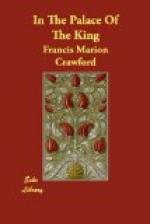But he was not a common coward, and in spite of his own pardonable terror, he thought first of the innocent girl whose name and fame would be gone if she were found lying upon her murdered lover’s body, and so far as he could, he saved her before he thought of saving himself, though with infinite difficulty and against her will.
Half paralyzed by her immeasurable grief, she lay against the parapet, and the great sobs came evenly, as if they were counted, shaking her from her head to her waist, and just leaving her a breathing space between each one and the next. The jester felt that he could do nothing. So long as she had seemed unconscious, he had tried to help her a little by supporting her head with his hand and arm, as tenderly as if she had been his own child. So long as she did not know what he was doing, she was only a human being in distress, and a woman, and deep down in the jester’s nature there was a marvellous depth of pity for all things that suffered—the deeper and truer because his own sufferings in the world were great. But it was quite different now that she knew where she was and recognized him. She was no longer a woman now, but a high-born lady, one of the Queen’s maids of honour, a being infinitely far removed above his sphere, and whose hand he was not worthy to touch. He would have dared to be much more familiar with the King himself than with this young girl whom fate had placed in his keeping for a moment. In the moonlight he watched her, and as he gazed upon her graceful figure and small head and slender, bending arms, it seemed to him that she had come down from an altar to suffer in life, and that it had been almost sacrilege to lay his hands upon her shoulders and keep her from doing her own will. He almost wondered how he had found courage to be so rough and commanding. He was gentle of heart, though it was his trade to make sharp speeches, and there were wonderful delicacies of thought and feeling far down in his suffering cripple’s nature.




